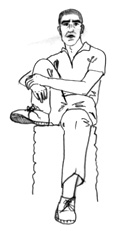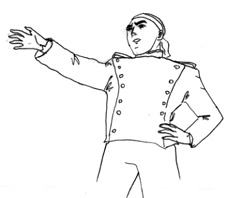
(In the summer of 1968, I met with Yukio Mishima. I was 21 years old. The meeting was recommended by my maternal grandfather who was a close friend of Mr. Azusa Hiraoka, Mishima's father. I asked Toshio Machinaga-he is currently an NHK announcer-who was a sympathizer of the Sanpa Faction of Zengakuren to join my visit, and we went to the Mishima house. The following is my diary of that day.)
 The Mishima house was located in a relatively quiet residential area, a short bus ride from JR Omori Station. At the end of a high mud fence, there was a wooden gate with the nameplates of Kimitake Hiraoka and Azusa Hiraoka on each of left and right side. We entered the site through the gate. We went in from the Japanese style entrance, and to the right there was a living room of Mr. Azusa Hiraoka. From the living room, we could see over the fence the building where Mishima lived and the lawn in the garden.
The Mishima house was located in a relatively quiet residential area, a short bus ride from JR Omori Station. At the end of a high mud fence, there was a wooden gate with the nameplates of Kimitake Hiraoka and Azusa Hiraoka on each of left and right side. We entered the site through the gate. We went in from the Japanese style entrance, and to the right there was a living room of Mr. Azusa Hiraoka. From the living room, we could see over the fence the building where Mishima lived and the lawn in the garden.
Å@At one o'clock in the afternoon, Mishima came out to the garden so we went down there to join him. He was wearing dark brown shorts and a pair of canvas shoes. He had thick chest hair, unusually well-muscled, but slightly loosened maybe because he just woke up. Later on, I noticed when he was making a phone call that his chest frameworks were poor and the muscles of the same thickness as the bones were put above the frameworks. His hair was slightly gone and greasy all over, he seemed not to have washed his face yet. He brought with him a black attache case (inside it were documents, medicines, etc.) and many letters. His breakfast was a piece of bread, milk, eggs fried sunny-side up (without bacon), grapefruit, and melon, afterward. Cola was served for us.
The garden was not so large and the lawn was not beautifully trimmed.Å@Chairs were fixed to the ground and I don't think they were made of wood.
Mishima looked at my name written on the back of business card and asked why my last name was not Nagasawa, so I explained to him a little about it. Then Mishima said "all of my relatives are vulgar people and it's quite strange that a person like me was born", and hastily added like he usually did "well, to tell the truth, writers may be the most vulgar kind of people". Next, Mishima told us that he had ran across demonstrators yesterday when he was running to the gym for body-building training and teased a girl in the group. This was probably an ironic remark against Machinaga. Of course Machinaga could not say a word back to Mishima. I told him that we often had demonstrators activities at Waseda, and he said that he visited Waseda a little while ago in some connection with kendo (Japanese fencing), but the name of the person who introduced Mishima was not posted on the wall.
I asked him if he liked fantasy novels or not and he asked me back what I meant by the word "fantasy novels". I answered "novels like Ray Bradbury's" and he said he didn't like Bradbury very much because his novels remind me of Osamu Dazai. Next, Mishima talked about something about "gothic roman" which I had never heard of. I wondered what they were. He said they were stories like Frankenstein. He told us about a novel which resembles "The Erlking" or "The Magic Flute" and said it's a very frightening story. Then he began talking about SF and told us that Sakyo Komatsu writes too much lately and if you write too much, your writing style would get spoiled. I asked him what he had thought about Ryu Mitsuse and he answered Mitsuse had not established his writing style yet. It seemed that he had not read "Tasogare ni Kaeru (Return in the Evening)" yet. We continued our talks on SF movies. Mishima said "2001: A Space Odyssey" was interesting but on the other hand, he added, he could not understand it at all. He admitted that recent SF movies are getting better and that he liked "Forbidden Planet". As for SF novels, he praised very highly of "Childhood's End" by A.C. Clarke for both of its plot and style. Then, we began talking about "Beautiful Star", one of Mishima's works. He said to us that when he was writing the novel, he made a small astronomical observatory on the roof and searched for UFOs with Sakyo Komatsu. But, he added, they could not found one after all. When I told him that I had been impressed by the last scene with the flying saucer, he answered in a slightly looking down way, it's a matter of course that it had appeared in the scene. When I asked him if he was going to write a real science fiction novel, Mishima answered to me that you cannot write a real SF novel without professional knowledge, and added contemptuously that popular writers conspire with used book stores and lavish lots of money to monopolize the book industry, giving an example of historical period novels.
Talking about writing styles, Mishima said to Machinaga "if you have three moles on your back, they will appear on your style. Therefore, translation of a novel should be done by a person who has a similar writing style as yours. He said his work "Forbidden Colors" is now being translated and he is worried because the translator is someone who did a horrible translation before. As one of the examples of wrong translations, he mentioned one sentence from "The Temple of the Golden Pavilion"; "he stopped at the eight bridge". He said the original Japanese sentence was "Yatsuhashi no mae de tachi domatta (he stopped in front of the wooden board connected bridge). He also told us that when he translated "Arabian Nights' Entertainments" from the original French version into Japanese language, he worked with a French language translator and heavily depended on dictionaries.
 Machinaga asked Mishima about Takehiko Noguchi's novel "After the Flood". With respect to the scene where a woman felt the end of the world as she looked at the evening sun, Mishima gave us an interesting expression; a woman never feels such a way even if you shake her upside-down. But he added that Takehiko Noguchi's essay on Mishima was excellent.
Machinaga asked Mishima about Takehiko Noguchi's novel "After the Flood". With respect to the scene where a woman felt the end of the world as she looked at the evening sun, Mishima gave us an interesting expression; a woman never feels such a way even if you shake her upside-down. But he added that Takehiko Noguchi's essay on Mishima was excellent.
He named Kenzaburo Oe as the biggest postwar writer (of course, excluding Mishima himself, I guess), but since Oe graduated from the Department of Literature (especially, French Literature), his novels lack the foundation based on the social sciences system.
After about an-hour talk, Mishima suddenly stood up saying that he was sorry but he had some work to do, then he grabbed the attache case and left.
(Before I met Mishima, I had never read any of his novels. After the meeting with Mishima was arranged, I read several of his works and was greatly impressed. I sent a letter of appreciation to Mishima and closed it with a sentence "Please die nobly". At that time, Mishima had finished writing "Voices of the Heroic Dead" and intensifying his right-wing opinions and activities. I had a firm belief that Mishima would die a heroic death. On November 25, 1970, Mishima committed suicide.)